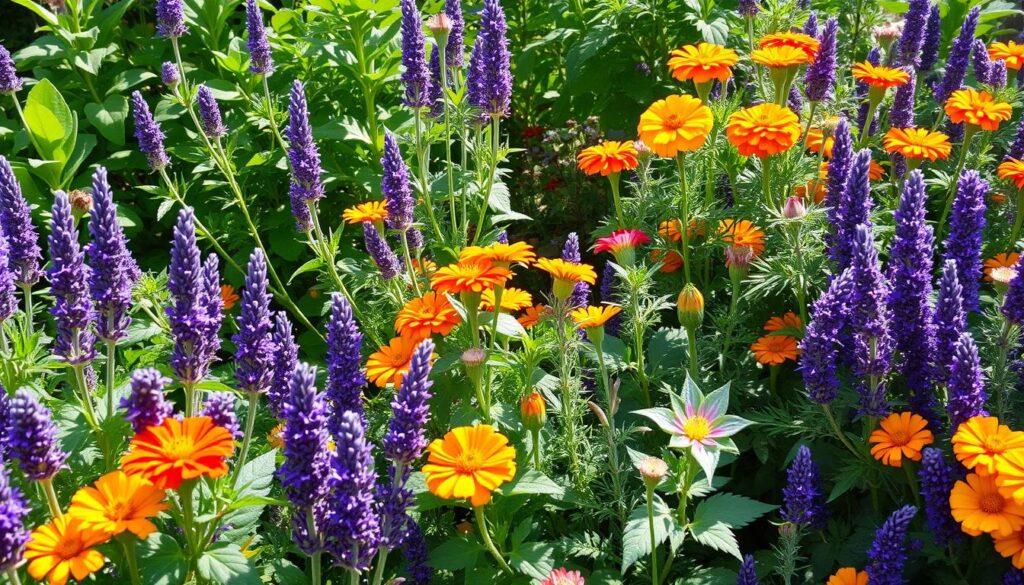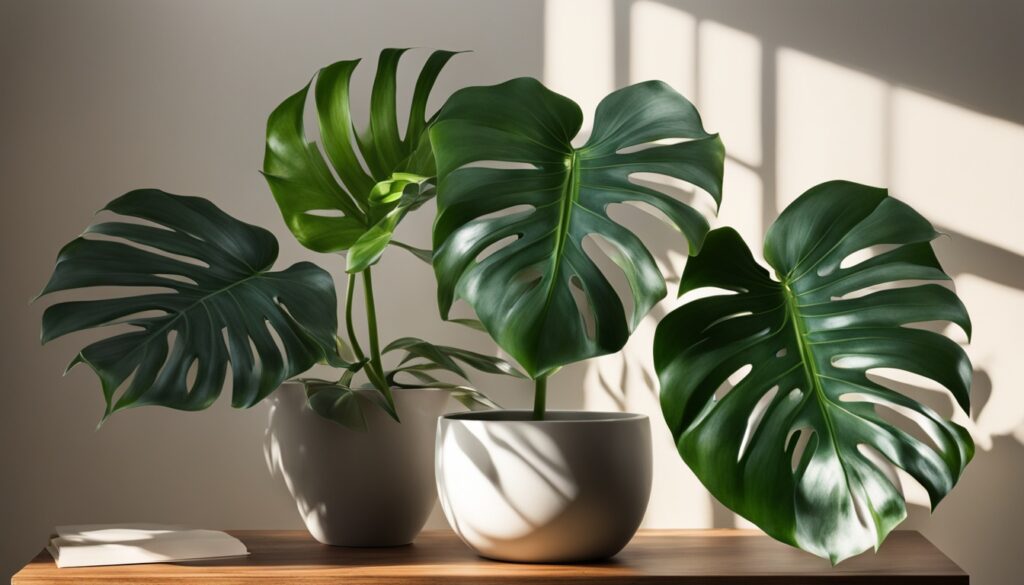Are you tired of ants taking over your home or garden? Take back your space with nature’s help. Some plants have special powers to keep ants away. They’re a safe and green way to fight off ants.
Lavender’s scent and rosemary’s smell are just a few examples. The plant world is full of natural helpers against ants. By adding these plants to your garden, you can make a safe and pest-free area for everyone.
Key Takeaways
- Certain plants like mint, lavender, and rosemary possess natural properties that deter ants.
- These plants use strong scents, essential oils, or by attracting ant predators to repel ants.
- Natural ant deterrents offer a safe and eco-friendly alternative to chemical pesticides.
- Strategically incorporating ant-resistant plants in your garden can create a harmonious, pest-free environment.
- Proper placement and maintenance of these plants are key to maximizing their ant-repelling effectiveness.
Understanding Ant Behavior and Natural Deterrents
Ants use their sense of smell to navigate and communicate. They have more scent receptors in their antennae than other insects. Breaking these scent trails is key to natural ant control.
How Ants Navigate Using Scent Trails
Red imported fire ants, odorous house ants, carpenter ants, and pharaoh ants are common. They leave pheromone trails to guide their colony to food. This helps them forage and communicate efficiently.
Why Natural Solutions Matter
Choosing natural ant deterrents is important. Outdoor ant infestations can signal other pests like aphids and termites. Natural methods like diatomaceous earth and mint are safe for pets and children.
The Role of Essential Oils in Ant Control
Many plants produce essential oils that repel ants. These oils disrupt ants’ scent trails. Adding ant-repellent plants to your garden can keep ants away.
| Ant Species | Characteristics | Preferred Habitats |
|---|---|---|
| Red Imported Fire Ant | Large ants with reddish-brown bodies, aggressive and known for painful stings | Outdoor areas, creating large mounds |
| Odorous House Ant | Small, black ants with erratic movements and noticeable trails | Indoors and outdoors, attracted to sweet foods |
| Carpenter Ant | Large ants that tunnel through wood, causing potential structural damage | Outdoors, in wood structures and trees |
| Pharaoh Ant | Small, adaptable ants with multiple nesting sites and fast reproduction rates | Indoors, in warm, moist environments |
Understanding ant behavior and their scent-based communication is key. By disrupting scent trails and using essential oil plants, gardeners can keep ants away.
What Plants Deter Ants: A Comprehensive Guide
When it comes to ant-proof landscaping and plant-based ant control, some plants are super effective. These plants have strong scents or natural compounds that keep ants away. They act as a natural barrier against these pests.
Mint is a well-known ant-repeller. Both peppermint and spearmint varieties repel ants with their strong smell. Other great plants include lavender, rosemary, marigolds, and chrysanthemums. Chrysanthemums even have a compound called pyrethrum that messes with ants’ nervous systems.
Aromatic herbs like citronella and lemongrass are also good at keeping ants away. Even kitchen staples like garlic and basil can keep ants out with their strong smells.
To really keep ants away, mix different ant-repelling plants in your garden. Place them around entry points and busy areas. This way, you can naturally defend your space against ants.
| Plant | Ant-Repelling Qualities |
|---|---|
| Mint | Strong fragrance that drives ants away |
| Lavender | Disliked by ants due to its intense aroma |
| Rosemary | Emits an intense scent that repels ants, flies, gnats, and mosquitoes |
| Marigolds | Contain natural compounds that act as an insecticide against ants |
| Chrysanthemums | Contain pyrethrum, a common insecticide ingredient, making them an active natural ant repellent |
By using these ant-proof landscaping and plant-based ant control methods, you can keep ants away. You won’t need harsh chemicals. Your home and garden will be protected by insect-deterring vegetation.
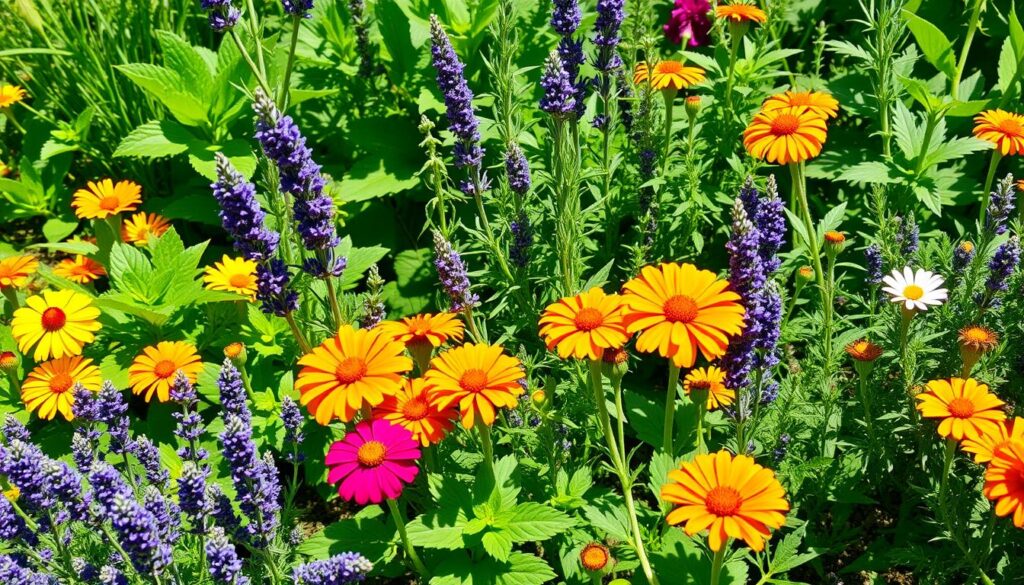
Mint: The Ultimate Ant-Repelling Herb
Mint is a top choice for keeping ants away naturally. Peppermint and spearmint are especially good at this, thanks to their menthol compounds. Their strong scent confuses ants, making it hard for them to find their way.
Different Types of Mint for Pest Control
Peppermint and spearmint are not the only mints that keep ants away. Pennyroyal and catnip also work well. These plants release oils that ants don’t like, helping to keep them out of your home and garden.
How to Plant and Maintain Mint Barriers
- Mint loves well-drained soil and lots of sunlight, making it easy to grow for ant control.
- Put mint in places where ants are likely to come in, like near doors or in ant hotspots.
- Keep your mint healthy by trimming it often and watering it well. This helps it grow strong and keep ants away.
“The menthol compound in mint disrupts ants’ ability to communicate and navigate, effectively creating an impenetrable barrier.”
Using peppermint, spearmint, and other mints can help you fight ants without chemicals. Mint is a tough and useful herb that can help you reclaim your outdoor areas.
Lavender: A Fragrant Defense Against Ants
Lavender’s scent is lovely to humans but not to ants and other bugs. Its essential oils, like linalool and linalyl acetate, mess with ants’ sense of smell. This makes lavender a great natural ant deterrent and a strong repellent against mosquitoes and other pests.
Lavender is easy to add to gardens, pots, or as dried flowers indoors. It’s a fragrant defense against pests. Its ability to repel pests and its easy care make it a great choice for any space.
Lavender needs full sun and well-drained soil to grow well. It’s hardy and easy to care for. This makes it perfect for those who want a natural and sustainable way to fight ants.
“Lavender oil serves as a natural insect repellent due to its strong scent that disrupts ants’ scent trails for navigation.”
Lavender’s lavender essential oil, natural ant deterrent qualities, and aromatic plants make it a strong, eco-friendly choice. It’s great for gardens or DIY pest control. Lavender offers a fragrant and effective way to keep ants away.
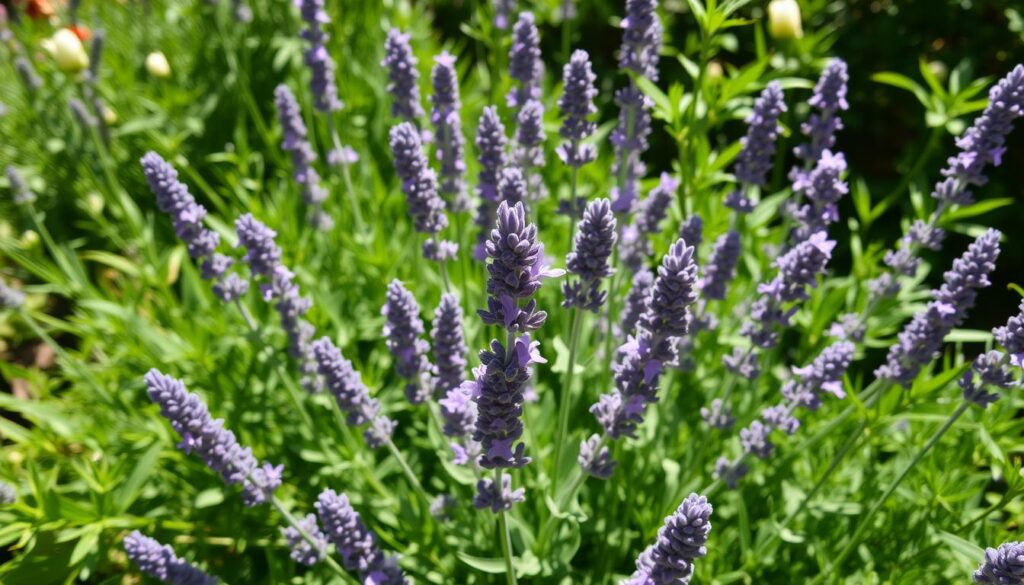
Rosemary: Dual-Purpose Herb for Cooking and Ant Control
Rosemary is a fragrant herb that’s great for cooking and keeping ants away. Its essential oils, like cineole and camphor, keep ants from coming near. By adding rosemary to your garden, you get tasty food and a pest-free space.
Growing Rosemary for Maximum Effectiveness
To make rosemary work best against ants, it needs the right conditions. It loves full sun and well-drained soil. Pruning it often makes it smell better and keep ants away.
Strategic Placement Tips
Plant rosemary in key spots to keep ants out. Place it near doors or paths to block their way. It also works well in garden borders or on patios. This way, your outdoor area stays pest-free.
“Rosemary’s essential oils, including cineole, camphor, and borneol, repel ants effectively, making it a valuable addition to any natural pest control arsenal.”
Using rosemary in your garden is smart. It adds flavor to your food and keeps pests away. With the right care and placement, rosemary helps keep your outdoor space pest-free.
Marigolds: Natural Pest Control Champions
Marigolds are top-notch for natural pest control. They have pyrethrum, a broad-spectrum insect repellent that keeps ants and other pests away. Their strong smell confuses ants, making them stay away from marigolds.
Marigolds also keep aphids, whiteflies, and nematodes at bay. They are great for companion planting in vegetable gardens. With their many sizes and colors, they add beauty and protect your garden.
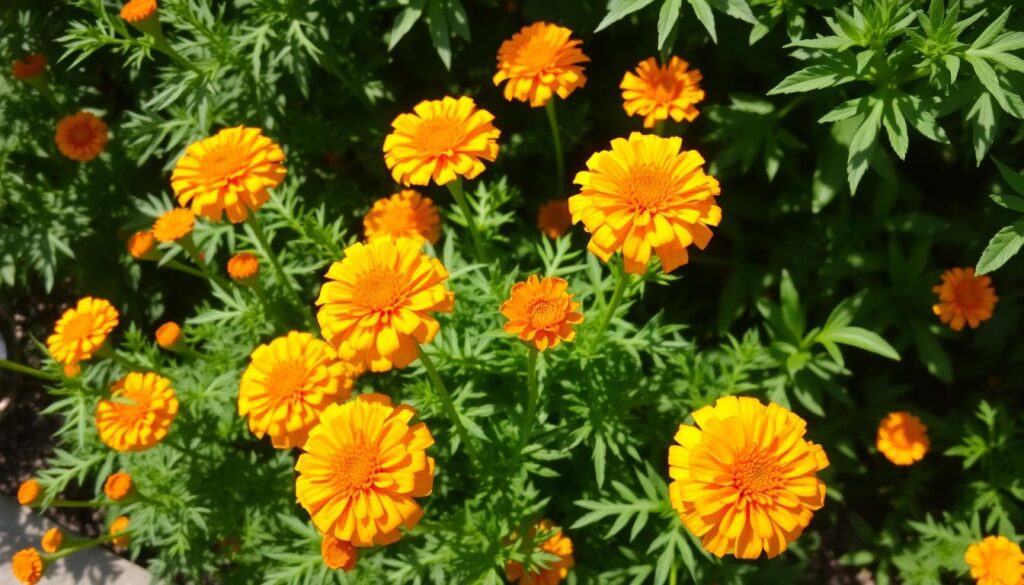
Marigolds are very versatile for pest control. You can plant them around your garden, in flower beds, or near plants that need protection. Their scent keeps ants and pests out.
Marigolds are a smart choice for gardeners of all levels. They help manage pests without using harsh chemicals. By using these flowers, you can have a healthy, pest-free garden.
| Pest | Marigold’s Effect |
|---|---|
| Ants | Repels ants due to strong scent |
| Aphids | Repels aphids, preventing infestation |
| Whiteflies | Helps control whitefly populations |
| Nematodes | Deters nematodes, both above and below ground |
By placing marigolds in your garden, you create a natural barrier. This barrier keeps pests away, letting your plants grow well. It’s a simple way to garden sustainably and enjoy a healthy harvest.
Chrysanthemums: Nature’s Insecticide
Chrysanthemums, or “mums,” are a great tool for fighting pests naturally. They have a powerful compound called pyrethrin that keeps ants away. These flowers come in many colors and shapes, making them easy to add to any garden.
Understanding Pyrethrin Content
The magic behind chrysanthemums’ ability to repel pests is pyrethrin. This natural insecticide targets the nervous systems of ants and other insects. It’s made up of six compounds that work together to protect plants.
Optimal Growing Conditions
To get the most out of chrysanthemums as natural insecticides, they need the right conditions. They love full sun and well-drained soil. Plant them around your garden or near your home to keep pests away.
“Chrysanthemums have been used as a powerful insecticide for centuries and are currently the most popular home insecticide.”
Chrysanthemums are not just beautiful; they also keep pests away. By using these mums, you can make your garden safe and healthy. They’re a key part of any pest control strategy.
Citronella and Lemongrass: Aromatic Ant Barriers
Gardeners often use citronella grass and lemon-scented geraniums to keep ants away. These plants not only smell great but also keep ants out of your garden. They add a fresh, citrusy scent to your outdoor space.
Citronella grass is especially good at hiding ant trails. It has lots of essential oils that confuse ants. This makes it hard for them to find food or start new colonies. Lemon-scented geraniums also keep ants away with their strong smell. They offer a natural way to protect your outdoor areas from pests.
Both plants do well in sunny spots and well-drained soil. They need regular water to grow strong and keep ants away. Adding these plants to your garden creates a natural barrier. It keeps ants out and makes your outdoor space more enjoyable.
“Lemongrass essential oil confuses ants’ chemical receptors, making it hard for them to find food, hence steering them away from this scent.”
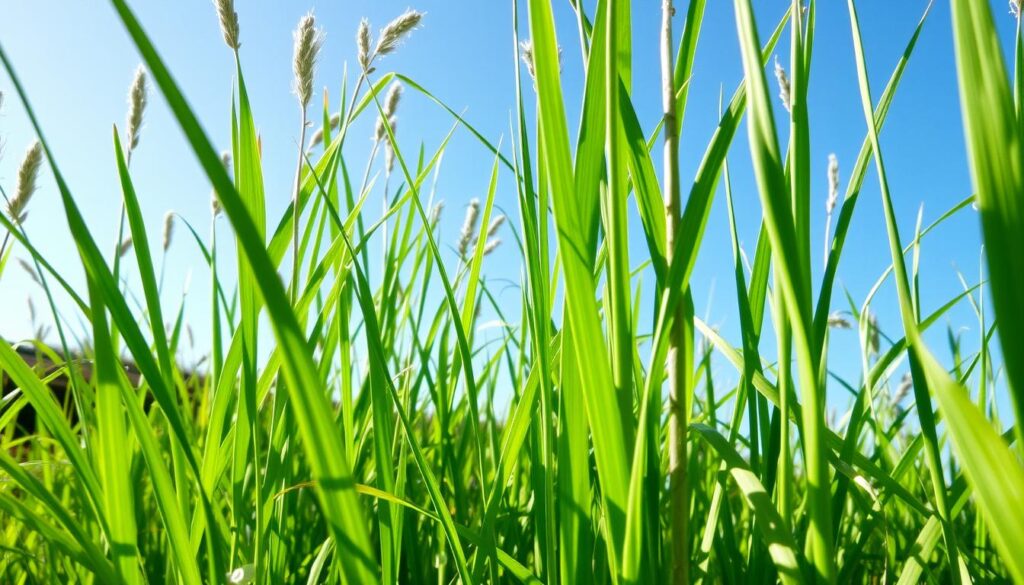
Citronella grass and lemon-scented geraniums are more than just ant repellents. You can use their leaves to make natural bug sprays. Their bright colors and textures also make your garden look great. By using these plants, you can enjoy a beautiful, ant-free garden that smells wonderful.
Essential Garden Planning for Ant Control
To keep your garden ant-free, you need a good plan and natural pest management methods. A key part of garden design is placing plants that keep ants away.
Strategic Plant Placement
Start by putting barriers around your home, garden edges, and where ants might get in. Use a variety of plants that repel ants to protect your garden. Mint, lavender, and rosemary can make a fragrant barrier that ants don’t like.
Creating Natural Barriers
- Use raised beds or containers to keep ants away from your plants.
- Plant a mix of annuals and perennials for all-season natural pest management.
- In your vegetable garden, place plants that keep ants away near your crops.
Design your garden well and choose the right ant-free gardening plants. This way, you can stop ants naturally and have a healthy garden.
“Strategic plant placement and the creation of natural barriers are the keys to maintaining an ant-free gardening space that thrives through natural pest management solutions.”
Indoor Plants That Keep Ants Away
Certain houseplants are great at keeping ants away. By adding houseplants for pest control to your space, you can make it look better and keep ants out. Let’s look at some top plants for keeping ants away.
Mint is a top choice for fighting ants. Plants like peppermint and spearmint have oils that ants hate. Putting mint near where ants might come in can keep them out.
Rosemary is another good plant. It has oils that ants don’t like. Adding rosemary to your indoor herb garden can help keep ants away.
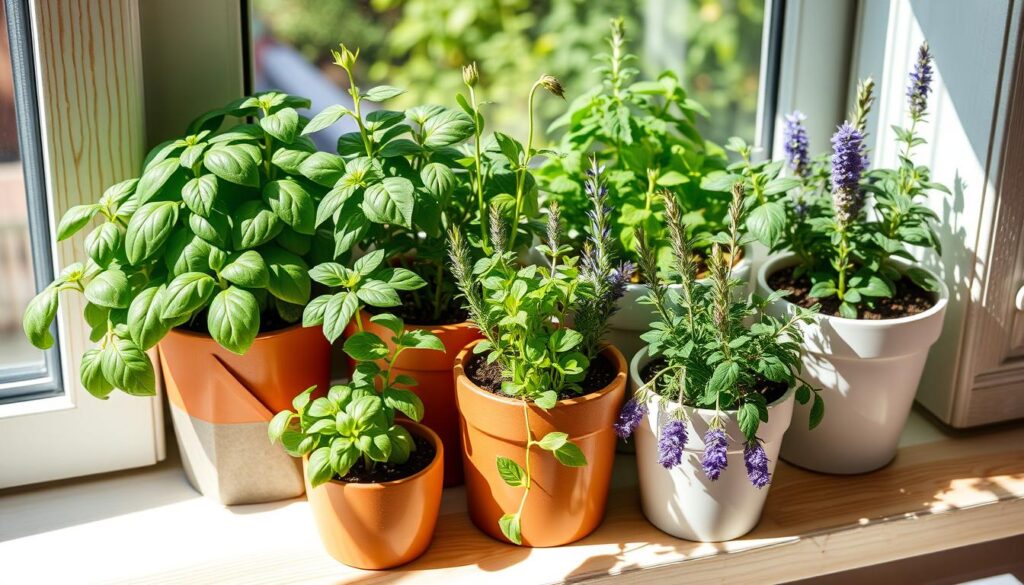
Lavender is also great. It smells nice and keeps ants away. Lavender’s oils mess with ants’ sense of smell and taste.
Other plants like bay laurel and chrysanthemums also work. Bay laurel can grow into a small tree. Chrysanthemums have pyrethrin, which kills ants and other bugs.
Using different houseplants for pest control can make your home look and feel better. It also keeps ants away. So, your home stays pest-free.
Combining Plants for Maximum Effectiveness
In the world of integrated pest management, mixing different ant-repelling plants boosts your natural bug control. By using a mix of synergistic plant combinations, you can create a strong defense against ants in your garden.
Begin with mint plants, known for their strong smell that keeps ants away. Add lavender and marigolds for their scent and color. This makes a beautiful and effective barrier around your garden.
Next, mix rosemary with chrysanthemums for a strong ant-repellent effect. Use citronella grass as a background. It adds height and a strong smell to your garden.
- Mint, lavender, and marigolds create a diverse, ant-deterring barrier
- Rosemary and chrysanthemums form a potent repellent combination
- Citronella grass provides a tall, aromatic backdrop for smaller herbs
Layering plants of different sizes makes your garden look great and keeps ants away. This method, based on integrated pest management, is a natural way to keep your garden free from ants.
“Companion planting embraces strategies that increase the biodiversity of agroecosystems, providing multiple deterrent mechanisms and improving garden aesthetics.”
Seasonal Considerations for Ant-Repelling Plants
Year-round pest control in your garden is crucial. Seasonal gardening strategies help keep ants away all year. Choose the right plants and care for them based on the season.
Spring and Summer Strategy
In spring and summer, use herbs and flowers that repel ants. Mint, lavender, and marigolds are great. Their smells and chemicals keep ants away. Seasonal gardening with these plants helps control pests all year.
Winter Protection Methods
In winter, change how you care for ant-repelling plants. Evergreen plants like rosemary and bay laurel protect in cold weather. But, tender plants might need extra care like mulching or moving indoors.
Use dried herbs or essential oils indoors in winter. They still send out smells ants dislike. This way, you keep pests away all year without just live plants.
| Ant-Repelling Plant | Active Compounds | Effectiveness |
|---|---|---|
| Chrysanthemums | Pyrethrins | Highly effective against a variety of pests, including ants, mosquitoes, and moths. |
| Peppermint | Menthol | Biocidal properties that deter and control ants, as well as other insects. |
| Pennyroyal | Pulegone, Menthone | Effective in exterminating and deterring ants due to its insecticidal compounds. |
Use seasonal year-round pest control methods and perennial ant repellents in your seasonal gardening. This way, you can keep ants and other pests out of your spaces all year.
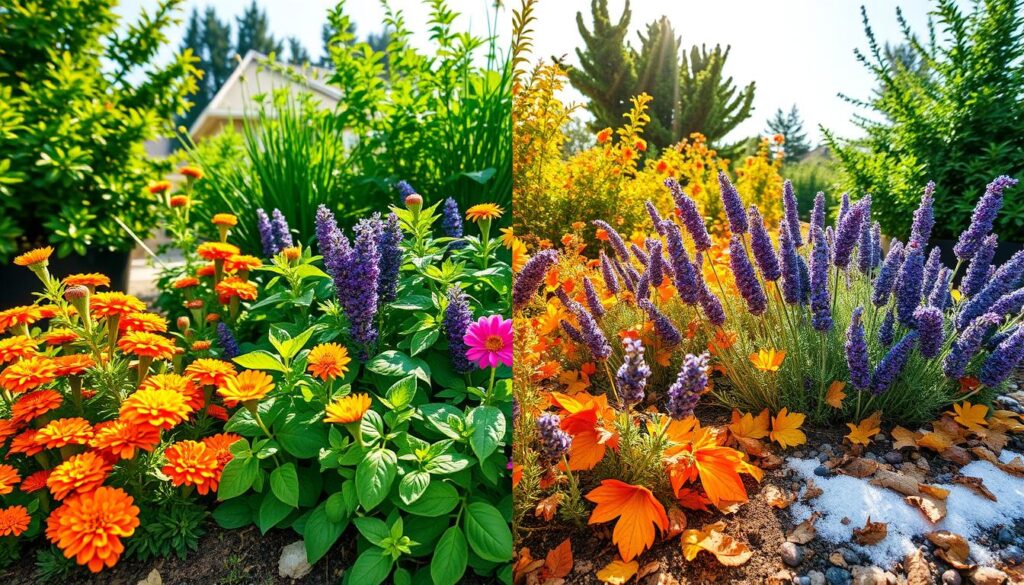
Maintenance Tips for Ant-Repelling Gardens
To keep your ant-repelling garden healthy, regular care is key. Prune herbs like mint, lavender, and rosemary often. This helps them grow and produce more oils, which keep pests away.
Remove dead flowers from marigolds and chrysanthemums to keep them blooming. This ensures a steady supply of natural bug killers.
Water your plants regularly, especially the ones that love moisture like mint. Fertilizing them when needed keeps them strong. Also, watch for pests or diseases and deal with them fast to keep your garden effective.
By following these tips, your garden will stay a natural and safe way to fight ants. Learn more about snake plant care to boost your garden’s defenses.
